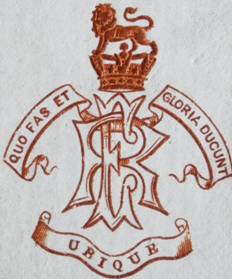
13290 Company Sergeant
Major
WALTER FREDERICK DONMALL
Royal Engineers
by
Lieutenant
Colonel Edward De Santis, MSCE, PE, MInstRE

Figure 1.
Royal Engineers Crest (Victorian)
(Image courtesy of Stuart Gase)
1. INTRODUCTION
This is an interesting story of a man’s desire to
serve this country in military service. Walter
Frederick Donmall first joined the Army in 1875 and served for almost 20 years
before he took his discharge in 1895. However,
when the Great War of 1914-1918 started, Donmall then 53 years of age, offered
his services once again. He enlisted
as a Sapper in the Royal Engineers early in 1915 to serve as an instructor and
he remained on active service in the U.K. for almost a year.
Unless otherwise noted, the details supplied in this narrative were obtained from the soldier’s service papers found in the WO97/1683 file at the Public Record Office in Kew, Richmond, Surrey. These papers cover his Regular Army service from 1875 to 1895. Also located were his discharge papers the cover the period from March of 1915 until his discharge in January of 1916.
Walter Frederick Donmall was born about January of 1861 in the Parish of Higher Kingcomb, near the town of Dorchester,[1] in the County of Dorsetshire, the son of Henry and Sarah Donmall. The 1881 Census Records for England do not include Walter Frederick Donmall because at the time of the census he was probably serving abroad in Malta. The census records do show that Henry Donmall was born in Greenwich, Kent in 1829 and that
Sarah Donmall was born in Deptford, Kent in 1829.[2] According to Walter’s enlistment papers, the Donmalls were Wesleyan.
3. PHYSICAL DESCRIPTION
The following is a description of Walter Frederick Donmall at the time he enlisted in the Army in 1875:
|
Apparent Age: |
14 years and 7 months |
|
Height: |
5 feet 4 inches |
|
Chest Measurement: |
31 inches |
|
Complexion: |
Fresh |
|
Eyes: |
Hazel |
|
Hair: |
Brown |
|
Smallpox Marks: |
None |
|
Vaccination Marks: |
Good (vaccinated in infancy and in 1871) |
|
Pulse: |
72 beats per minute |
|
Respiration: |
18 inspirations per minute |
|
Muscular Development: |
Good |
5. ASSIGNMENTS AND
CAMPAIGN SERVICE
Service
at Chatham (1875 – 1879)
Walter Donmall served at Chatham from 1875 to 1879 as a Boy Soldier and then underwent recruit training[7] in the School of Military Engineering after reaching the appropriate age for full time service as a Sapper in the Corps of Royal Engineers. On the 25th of September 1879 Donmall, by then a Lance Corporal, departed England for Malta where he arrived on the 8th of October. His service papers are not explicit with regard to his posting at Malta, but it is probable that he was assigned to a fortress company of the Royal Engineers, probably the 33rd Company.
Service
on Malta (1879 – 1881) and at Chatham (1881 – 1883)
Donmall
served on the island of Malta from 1879 to 1881 and was promoted to the rank of
2nd Corporal while he was there.
On the 11th of May 1881 he left Malta for home and was posted
to Chatham again on his arrival in England.
The unit he was assigned to at Chatham is not shown in his service
papers; however, he appears to have spent a great deal of time between 1881 and
1883 attending various classes of instruction.
During his time at Chatham, Donmall was promoted to the rank of Corporal.
Service at Gibraltar (1883 – 1885)
On the 19th of December 1883 Corporal Donmall departed England for Gibraltar, arriving there on the 27th of December. He served at Gibraltar for about 14 months, probably in another fortress company, and was then posted to Egypt for service in the eastern Sudan. Donmall sailed from Gibraltar on S.S. Queen on the 23rd of February 1885 and arrived at Suakin on the Red Sea on the 8th of March 1885.
Service
in the Sudan and Egypt (1885 – 1891)
While Corporal Donmall was at Chatham, momentous events were occurring in the Sudan. General Gordon[8] was besieged at Khartoum and ultimately slain by the forces of the Mahdi on the 26th of January 1885. On the receipt of intelligence of the fall of Khartoum to the Dervish forces, the first impulse of the British government was to persevere in the war in the Sudan, to recapture Khartoum, and to punish the Mahdi. With this in view, a railway was to be laid down from Suakin on the Red Sea to Berber, and Lieutenant General Sir Gerald Graham[9] was appointed to command the troops necessary to protect its construction.[10]
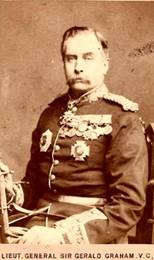
Figure
2. General Sir Gerald Graham, V.C.
(Photograph from the author’s collection)
There were four companies of the Royal Engineers serving in the Sudan at the time that Donmall arrived there. These were the 10th Railway Company and the 17th, 24th and 26th Field Companies.[11] Again, Donmall’s service papers make no reference to the unit in which he served; however, a study of dates and places eliminates all but the 10th Railway Company as the most logical possibility.
The 10th Railway Company, Royal Engineers was commanded by Major W.H. Rathbone, R.E.[12] Other officers in the company included Captain H.G. Kunhardt, R.E.,[13] Captain W.A.E. St. Clair, R.E.,[14] Captain G.H. Sim, R.E.,[15] Lieutenant F.A. Molony, R.E.,[16] and Lieutenant H. Bonham-Carter, R.E.[17] In addition to regular soldiers of the Royal Engineers, the 10th Railway Company listed 39 Volunteers on its rolls, 25 of them from the 1st Newcastle and Durham Engineers, 7 from the 1st Lancashire Engineers, and the remaining 7 from various other corps, enlisted for the duration of the war. The normal peace time establishment for the Royal Engineers railway companies was 2 officers, 6 staff sergeants and sergeants, 2 buglers, 14 corporals and second corporals and 43 sappers. This strength represented only the cadre for the company in wartime.[18] At the time that Corporal Donmall joined the unit it was in the process of active service expansion. In Egypt the company would also employ a civilian work force to assist in its work.
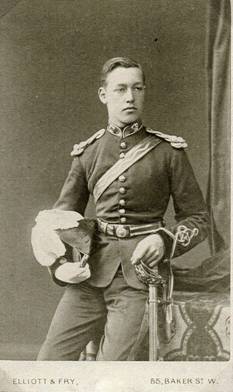
Figure 3. Captain W.A.E. St.
Clair, R.E.
(Photograph from the collection of Fred B. Larimore)
The company sailed from England on the 14th of March 1885 to join the command of Lieutenant General Sir Gerald Graham and landed at Suakin on the 7th of April.[19] A party under Captains Kunhardt and St. Clair and Lieutenant Molony was detailed to survey and stake out the proposed railway line, while the remainder of the company worked on the 18-inch gauge railway system around the town. Corporal Donmall and his company subsequently worked on extending the railway line from Quarantine Island in Suakin harbour to Handub and Otao where it arrived on the 30th of April. During this time 16 miles of track were completed. Construction on the railway ceased in early May of 1885 when hostilities ended in the area. For his service in the campaigns in the eastern Sudan, Donmall was awarded the Egypt 1882 Medal with clasp [SUAKIN 1885] as well as the Khedive’s Bronze Star.[20]
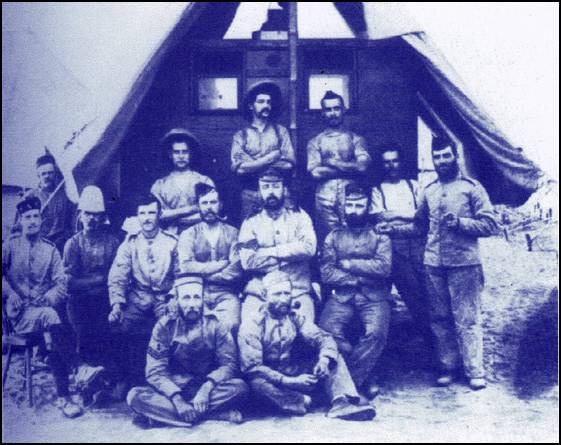
Figure 4. Headquarters, 10th
Railway Company, R. E., Suakin, Egypt, 1885.
(Photograph from the author’s collection)
Donmall did not leave Egypt after hostilities ended in May of 1885.
On the 9th of June he was posted to Abbassia where he was
promoted to the rank of Sergeant less than two months later.
On the 14th of December 1885 he was posted to Cairo.
Again, Donmall’s service papers give no indication of the unit to which
he was assigned or the type of work he did while in Egypt.
He served in Egypt for almost seven years before returning home. While in
Egypt he married Ellen Jeffries Murray, with leave, at Alexandria on the 9th
of August 1889. He and his wife were
placed on the Married Establishment on that date.[21]
Service at Chatham (1891 – 1895)
Sergeant Donmall and his wife arrived home from Egypt on the 23rd of October 1891. Upon his arrival he was posted to Chatham where it is believed that he joined the 18th Company, Royal Engineers. He remained at Chatham until 1895 at which time he applied for discharge to pension with 18 years of service. While he was serving at Chatham he was promoted to the rank of Company Sergeant Major and was authorized the award of the Long Service and Good Conduct Medal[22] by Army Orders dated the 1st of April 1894. Company Sergeant Major Donmall was discharged from the Army on the 15th of July 1895.
6. PROMOTIONS AND CONDUCT
a. Promotions: Walter Frederick Donmall received the following promotions during his time in service:
Date of Promotion or Appointment |
Rank
or Position |
|
January
1879 |
Joined the ranks as a Sapper upon reaching eligible age for normal enlistment. |
|
4 March 1879 |
Appointed to the rank of Lance Corporal.[23] |
|
1 September 1880 |
Promoted to the rank of 2nd Corporal. |
|
1 September 1882 |
Promoted to the rank of Corporal. |
|
1 August 1885 |
Promoted to the rank of Sergeant |
|
1 April 1893 |
Promoted to the rank of Company Sergeant Major |
b. Conduct: Walter Frederick Donmall received the following Good Conduct Badges during his time in service:
Date of Award |
Good
Conduct Badge |
|
3 April 1890 |
Eligible for Good Conduct Pay at 3.d.[24] |
|
6 April 1894 |
Eligible for Good Conduct Pay at 4.d. |
a. Education: Walter Frederick Donmall earned a 2nd Class Certificate of Education during his time in service.[25]
b. Qualifications and Training: Walter Frederick Donmall received the following qualifications and training during his time in the Army.
Date |
|
|
1879 |
Passed class of instruction at the Drawing School, School of Military Engineering, Chatham, Kent. |
|
1882 |
Passed class of instruction in Field Works at the School of Military Engineering, Chatham, Kent with a rating of “Good.” |
|
1882 |
Passed class of instruction in Musketry at the School of Musketry, Hythe, Kent. |
Company Sergeant Major Donmall received the following medals during his time in service:
|
|
|
|
Figure 5.
The Egypt 1882 Medal with clasp [SUAKIN 1885] |
Figure 6.
The Khedive’s Bronze Star, 1884-1886 |
(Images from the author’s collection)
NOTE: The medals shown above are not those of Company Sergeant Major Donmall. The whereabouts of these medals is unknown to the author.
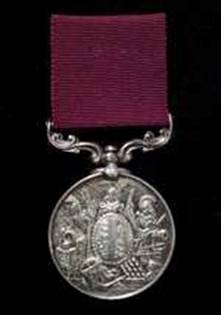
Figure 7. The Army Long
Service and Good Conduct Medal
Of Company Sergeant Major Donmall.
(Photograph from the author’s collection)
NOTE: The medal is named
in engraved upper case script to:
13290 Coy S.MAJ. W.F.DONMALL
9. MEDICAL INFORMATION
The following medical information was taken from Walter Frederick Donmall’s service records during his time in service:
Location |
Date
of Admission |
Ailment |
Period
of Hospitalization or
Treatment |
|
Chatham |
21 Mar 1877 |
Bronchitis |
Released from hospital on 30 Mar 1877 |
|
Malta |
27 Jul 1880 |
Febricula[26] |
Released from hospital on 3 Aug 1880 |
|
Malta |
17 Aug 1880 |
General Debility |
Released from hospital on 9 Sep 1880 |
|
Chatham |
3 Oct 1883 |
Revaccination against smallpox |
Revaccinated by H.W. Hubbard, Army Medical Department. Vaccination “failed.” |
|
Suakin |
16 Apr 1885 |
General Debility |
Released from hospital on 3 May 1885. |
|
Ramleh |
10 Feb 1887 |
Tubercule[27] |
Released from hospital on 26 Feb 1887. |
|
Cairo |
7 Dec 1887 |
Medical examination |
Found fit for re-engagement to complete 18 years with the Colours. |
|
Cairo |
16 Sep 1890 |
Re-vaccinated against smallpox |
Vaccination “failed.” |
|
Cairo |
25 Aug 1891 |
Fever |
Released from hospital on 29 Aug 1891. |
|
Chatham |
22 Mar 1895 |
Dyspepsia[28] |
Released from hospital on 24 Apr 1895. |
The British Census of 1881 shows that the parents of Company Sergeant Major Donmall were living at 33 Chatham Street, Newington, Surrey. His father’s occupation was listed as a Peddler.[29] Other persons residing in the Donmall household at the time included a woman by the name of Jane Nash, age 53, of York, a Missionary, and Samuel Nash, age 13, a student and the son of Jane Nash.
At the time of Donmall’s marriage in 1889, his mother was listed as his next of kin. Her address at that time is shown in his service papers as Kingston, Surrey. Presumably his father was deceased at this time.
Walter Frederick Donmall and Ellen J. Murray were wed in Alexandria, Egypt on the 9th of August 1889. Eight and a half months after their return to England from Egypt, Ellen Donmall gave birth to their first child at Chatham. Their daughter Mary Maud was born on the 13th of July 1891. A second child, Evelyn Elizabeth, was born to the Donmalls on the 27th of January 1893 and their third child, James William Frederick was born on the 11th of November 1893. Tragically, James William Frederick Donmall died on the 20th of January 1894 at the age of 2 months and 9 days.
The 1901 Census of England provides the following information about the Donmall family at the turn of the century:
|
Address:
17 Alma Road, Cheriton, Kent |
||||
|
Name |
Relation |
Age |
Occupation |
Place
of Birth |
|
Walter F. Donmall |
Head |
40 |
Draughtsman |
Higher Kingcombe, Dorset |
|
Ellen J. Donmall |
Wife |
33 |
|
Alexandria, |
|
Maud M. Donmall |
Daughter |
10 |
|
Cairo, |
|
Evelyn E. Donmall |
Daughter |
8 |
|
Chatham, |
|
Elizabeth S. Donmall |
Daughter |
5 |
|
Edinburgh, |
|
Emily M. Donmall |
Daughter |
10 mos |
|
Cheriton, |
Walter Frederick Donmall was discharged from the Army at Chatham, Kent on the 15th of July 1895 on the termination of his second period of limited engagement. His total service was reckoned as shown in the tables below:
Location |
Period
of Service |
|
Home |
6 November 1875 – 24 September 1879 |
|
Malta |
25 September 1879 – 10 May 1881 |
|
Home |
11 May 1881 – 18 December 1883 |
|
Gibraltar |
19 December 1883 – 22 February 1885 |
|
Egypt |
23 February 1885 – 22 October 1891 |
|
Home |
23 October 1891 – 15 July 1895 |
Location |
Period
of Service (*) |
|
Home Service |
10 years and 81 days |
|
Service Abroad |
9 years and 171 days |
Total Service: |
19 years and 252 days |
Lieutenant Colonel W.G. Morris, R.E.,[30] Assistant Commandant of the School of Military Engineering confirmed Donmall’s Statement of Service prior to his discharge. His discharge papers indicate that his habits were rated as “Regular” and his conduct as “Very Good” during his time in service. There is no indication in his record of Donmall’s name appearing in the Regimental Defaulters’ Book or of his ever having been tried by court-martial for any offence.
12. POST SERVICE LIFE
Company Sergeant Major Donmall was admitted as a Royal Hospital Chelsea Pensioner on the 23rd of July 1895 for medical examination. He and his family took up residence at 8 Tarvit Street in Edinburgh where Donmall became employed as an Architectural Draughtsman, thereby putting to work the skills that he had acquired in the Army.
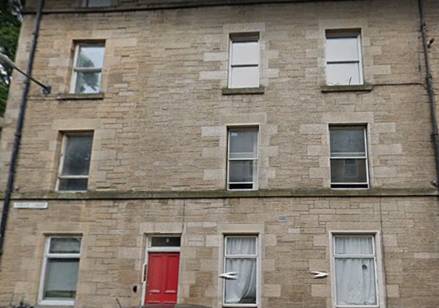
Figure
8. The Donmall Residence at 8 Tarvit
Street in Edinburgh.
(Photograph courtesy of Google Earth)
The Donmalls moved to Kent sometime between 1898 and 1901, perhaps because of a change of employment for Walter. While at Cheriton he continued to work as a Draughtsman. By 1906 the family had moved to Edinburgh and resided at 10 Parsons Green Terrace.
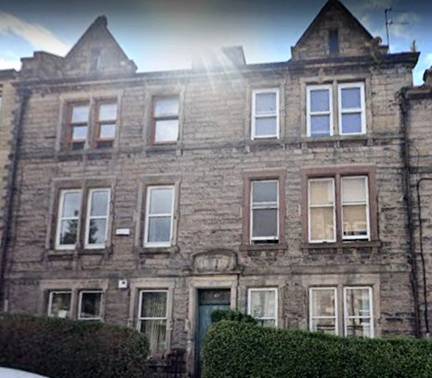
Figure
9. The Donmall Residence at 10
Parsons Green Terrace.
(Photograph courtesy of Google Earth)
Walter continued working as a Draughtsman and it is clear from the residence at 10 Parsons Green Terrace that his economic situation was improving. The family was now living in an attached home rather than a large apartment block. By 1908 the family had moved to 31 Meadowbank Crescent in Edinburgh. In the photograph below, 31 Meadowbank Crescent is the structure at the right-hand corner of the near row of buildings of the apartment complex.[31] The family was living at this address when the Great War of 1914-1918 began. The Electoral Registers of Edinburgh show that from 1912 to 1915 he was employed as a Watchman.
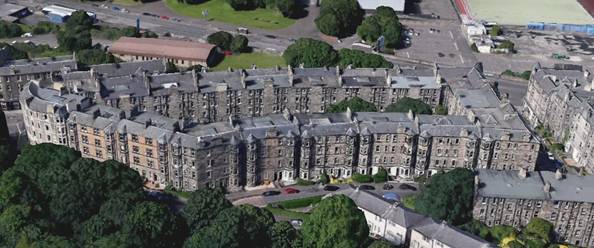
Figure
10. Meadowbank Crescent, Edinburgh.
(Photograph courtesy of Google Earth)
On the 18th of March 1915 Walter Frederick Donmall enlisted in the Royal Engineers as a Sapper, relinquishing his previous Regular Army rank of Company Sergeant Major. On his enlistment papers he was listed as a “Re-enlisted Pensioner.” The following is a description of him on enlistment:
|
Age: |
53 years and 359 days |
|
Height: |
5 feet 9½ inches |
|
Weight: |
170 pounds |
|
Chest
(expanded): |
39 inches |
|
Range
of Expansion: |
2 inches |
|
Physical
Development: |
Good |
|
Vaccinated: |
In infancy |
|
Vision: |
6/18[32] |
|
Trade: |
Draughtsman (Architectural) |
After his enlistment Donmall was posted as an instructor, presumably to instruct other draughtsman, at the Royal Engineers Training Center in Deganwy, Wales. It appears that he was assigned to the R.E. Depot Company at first and then to the 138th Fortress Company, which was stationed at Deganwy.
On the 10th of January 1916 Donmall was discharged from the Army. His description on discharge is given below:
|
Age: |
55
years |
|
Height: |
5
feet 10½ inches |
|
Weight: |
170
pounds |
|
Chest
(expanded): |
39
inches |
|
Range
of Expansion: |
2
inches |
|
Complexion: |
Fresh |
|
Eyes: |
Hazel |
|
Hair: |
Grey |
|
Trade: |
Draughtsman
(Architectural) |
According to the Electoral Registers for Edinburgh, Walter and Ellen Donmall lived at 29A Meadowbank Crescent from 1916 to at least 1940. In 1940 he would have been 79 years old and Ellen would have been 72.
From 1918 to 1919 Donmall was employed with Clerical Work at a Recruiting Office, presumably in Edinburgh. Even after his discharge from the Royal Engineers in 1916 he did not give up on his desire to serve the Army in some way. From 1920 to 1934 he was again employed as a Watchman. Perhaps the world-wide depression prevented him from continuing his work as a Draughtsman. From 1934 to 1940 he apparently was retired. No information has been uncovered to indicate his date of death.
Books
1.
CONOLLY, T.W.J. Roll
of Officers of the Corps of Royal Engineers From 1660 to 1898.
The Royal Engineers Institute, Chatham, Kent, 1898.
Census Documents
Soldier’s Service Papers
a. Proceedings on Attestation (W.O. Form 39).
b. Description on Enlistment.
c. Military History Sheet.
d. Medical History (W.O. Form 1143).
e.
Statement of Services.
[1] Donmall’s Record of Service indicates that he was born near the town of Dorset. The author believes that there is an error in his Proceedings on Attestation and that the town name should be Dorchester.
[2] 1881 British Census. Church of Jesus Christ of Latter Day Saints. FHL Film 1341121, PRO Ref. RG11, Piece 0537, Folio 25, Page 6. It should be noted that the census records indicate that Henry Donmall was born in Greenwick, Kent. The author thinks that this is probably an error and that the town of his birth was really Greenwich.
[3]
See Explanatory Notes on Recruitment
of Boy Soldiers.
[4]
See Explanatory Notes on Periods
of Enlistment for the Corps of Royal Engineers.
[5] Arthur Kyle Haslett, later Major, Royal Engineers.
[6] Francis Edward Cox, later Major General.
[7]
See Explanatory Notes on Engineer
Recruit Training.
[8] CONOLLY, p. 33. Charles George Gordon, C.B., a Sapper Officer.
[9] Ibid., p. 32. Sir Gerald Graham, V.C., G.C.B., G.C.M.G. was a Sapper Officer. He retired from the Army on 14 June 1890 and died at Bideford, Devonshire, on the 17th of December 1899.
[10] PORTER, W., p. 80.
[11] GORDON, p. 211.
[12] CONOLLY, p. 42. William Hans Rathbone, later Colonel; retired 21 December 1898.
[13] Ibid., p. 49. Henry Geffcken Kunhardt, later Major; died at Marseilles on 4 November 1892.
[14] Ibid., p. 52. William Augustus Edmund St. Clair; later Lieutenant Colonel.
[15] Ibid., P. 51. George Hamilton Sim; later Lieutenant Colonel.
[16] Ibid., p. 58. Francis Arthur Molony; later Major. Major Molony’s King’s South Africa medal for service in the Boer War is also in the author’s collection.
[17] Ibid., p.59. Herman Bonham-Carter; later Major.
[18] GRIERSON, p. 65.
[19] These dates do not coincide with the dated in Donmall’s service papers. It is uncertain whether he joined the company in England or preceded it to Suakin and joined it there.
[20] Both of these medals were sold by Jeremy Tenniswood of Aldershot in 1985.
[21]
See Explanatory Notes Marriage
of Soldiers During the Victorian Period.
[22] This medal in the author’s collection prompted this research work.
[23] Based on his age, Donmall could only have been a Sapper for about four months before being appointed to the rank of Lance Corporal. This rapid promotion indicates that he must have performed his duties as a Boy Soldier in an outstanding manner.
[24]
See Explanatory Notes on Good
Conduct Pay.
[25] See Explanatory Notes on Certificates of Education.
[26] A fever.
[27] A nodule or swelling.
[28] Severe indigestion.
[29] 1881 British Census. Church of Jesus Christ of Latter Day Saints. FHL Film 1341121, PRO Ref. RG11, Piece 0537, Folio 25, Page 6.
[30] William George Morris, CMG, R.E., later Colonel.
[31] Electoral Rolls for Edinburgh.
[32] Snellen Visual Acuity rating. He could only see at 6 meters what one with better vision could see from 18 meters.